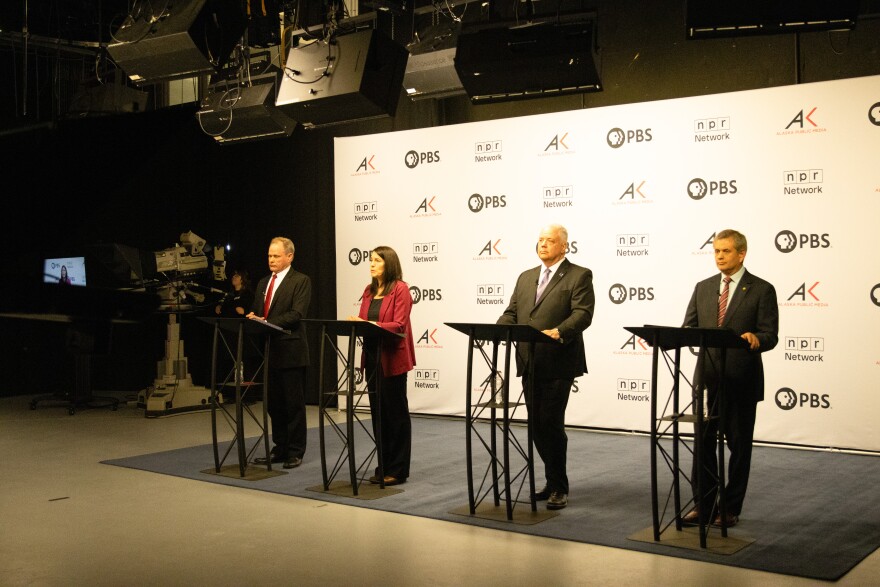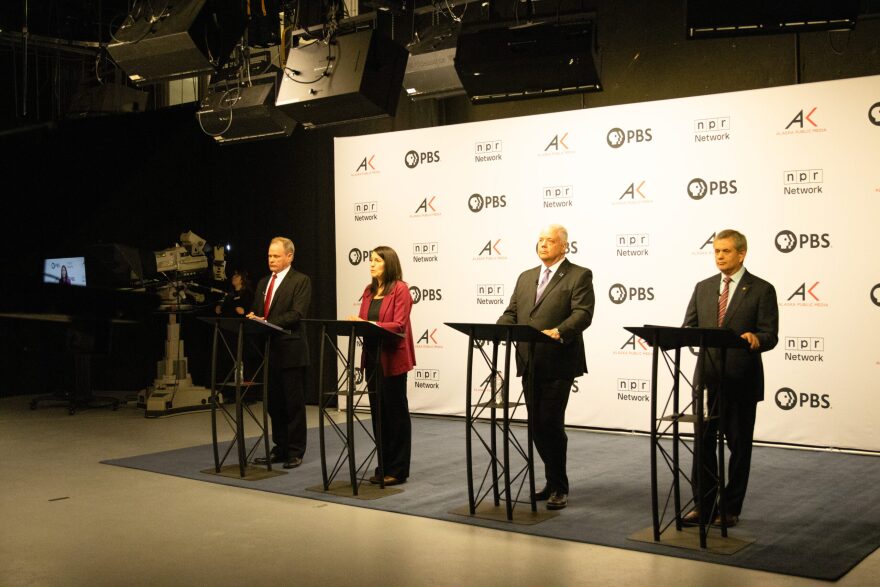The four major candidates for Anchorage mayor discussed a range of topics at a candidate debate held last night by Alaska Public Media and the Anchorage Daily News.
Anchorage Mayor Dave Bronson faces three major challengers in his bid for reelection. Suzanne LaFrance is a former Assembly member who served as Assembly chair for two years. Chris Tuck is a former Anchorage representative who served in the Legislature for 14 years and on the Anchorage School Board for two. Bill Popp was head of the Anchorage Economic and Development Corporation for 16 years.
All four have lived in Anchorage for decades and described Anchorage as a city in decline in need of revitalization.
“It’s been off the rails here for several years,” Bronson said.
“As a mom of three, my kids are growing up in a different Anchorage,” LaFrance said.
“Sadly, Anchorage is a shadow of what we once were,” Tuck said.
“In the last decade or so, we’ve really lost that optimism,” Popp said.
Over 90 minutes, all four candidates answered a series of questions related to topics like homelessness, an impending natural gas shortage, retaining the city workforce, public safety and the Port of Alaska. While most candidates gave similar answers about the need to maintain city functions, they differed on a number of topics, such as how the city should adapt to a changing climate.
Popp and LaFrance both mentioned the city’s climate action plan, implemented in 2019. The plan has languished under Mayor Bronson, and LaFrance suggested it’s time to “dust it off.”
“That includes developing clean energy,” LaFrance said. “It includes continuing to change out the light bulbs throughout the municipality, and finding ways to move to solar.”
Popp gave a similar answer, and added that some areas of city government, like snow removal, may need to adapt to a changing climate.
“A better snowplow strategy that takes into account that things are changing instead of looking backwards and assuming that whatever happens over the last 10 years as an average is what you plan for,” Popp said.
Tuck took a different approach, advocating for increased investment in education programs focused on renewable technology.
“We need to invest in our university, invest in science and technology there,” Tuck said. “And then go one step further with the prototype and materials development institute.”
Bronson highlighted his administration's efforts to reduce energy use by turning down thermostats and turning off lights in city buildings, but questioned how effective some climate change responses would be.
“Well, changing light bulbs and building more solar panels is not going to solve anything in our challenges,” Bronson said. “Especially in the winter, because there's no electricity produced by solar panels in the winter, nor by windmills for that matter.”
Windmills do actually produce electricity in the winter, with the industry standard windmill able to withstand temperatures as low as four degrees below zero, without additional cold resistant technology. Solar panels also work in the winter.
Candidates largely refrained from directly criticizing each other, though Bronson did put the blame for several city issues, including lack of shelter for the homeless, on LaFrance, due to her tenure as Assembly chair.
“I proposed a 1,000-person shelter,” Bronson said. “The Assembly led by Suzanne LaFrance as the Assembly Chair killed that project. So now we're stuck two years later, and on June 1, we have 874 homeless people hitting the street.”
LaFrance, who currently leads all candidates in fundraising, pushed back on the mayor’s claim, noting that she initially supported the mayor’s proposal for a pared-down, 150-person homeless shelter and navigation center.
“We do need more shelter and we need another navigation facility,” LaFrance said. “However, when costs ballooned, and the law concerning how to spend public money was broken, it became a matter of fiscal responsibility to stop the project. And unfortunately, the mayor has not come forward with another plan.”
While Tuck and Popp refrained from directly criticizing a specific opponent, they both positioned themselves as outsider candidates.
Tuck described his challengers as part of the reason for Anchorage’s decline.
“My opponents have had years to get Anchorage back on track,” Tuck said. “But instead we are left with a declining economy, a growing homeless problem. We have a failing education system. And we have a divisive and ineffective city government.”
Meanwhile, Popp criticized the political divide in city government, and described himself as nonpartisan.
“I
Tuck is a registered Democrat, while Bronson is a registered Republican. LaFrance is a registered nonpartisan, though she received a mayoral endorsement from the Anchorage Democratic Party, along with Tuck.
In total there are ten candidates for Anchorage mayor. The mail-in election will wrap up on April 2.
Editor’s note: Bill Popp is a former chair of the Alaska Public Media Board of Directors.



